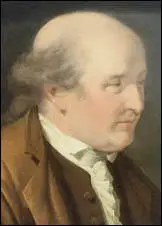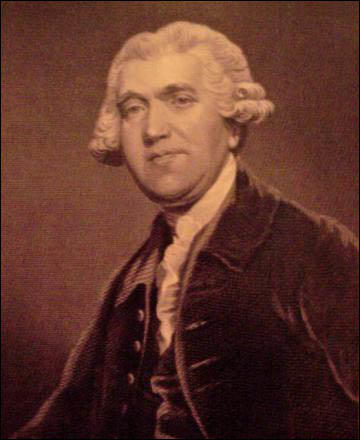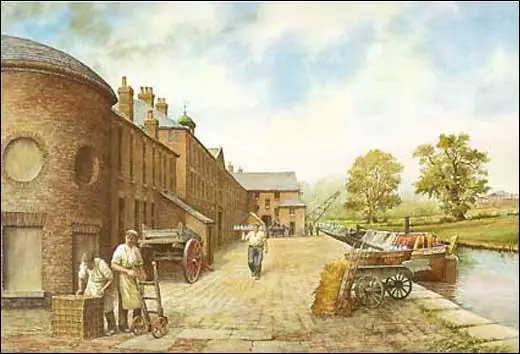Thomas Bentley

Thomas Bentley was born at Scropton, Derbyshire, on 1st January 1731. He was educated at the Presbyterian Collegiate Academy at Finderne, until he was sixteen, when he was indentured to a Manchester textile merchant. (1)
Bentley toured Europe and became fluent in French and Italian and developed an interest in art. On his return he moved to Liverpool and became a successful merchant in the city. (2)
Bentley also became a member of the Unitarian movement. There is no set doctrinal beliefs that all Unitarians agree on. In fact, the most important aspect of Unitarianism is the right of individuals to develop their own religious opinions. Unitarians tend to believe that Jesus Christ was a human religious leader to be followed but not worshipped. Unitarians argued that Jesus is the "great exemplar which we ought to copy in order to perfect our union with God". (3)
In 1754 at All Saints' Church, Chesterfield, he married Hannah, daughter of James Oates; she died in childbirth in 1759. Concerned with the restricted educational opportunities for dissenters, Bentley was a founder trustee of the celebrated Warrington Academy, that became known as "the cradle of Unitarianism". He also co-founded the Octagon Chapel in Liverpool. Bentley was also a passionate opponent of the slave-trade and supported parliamentary reform. (4)
On a visit to Liverpool in May 1762, Josiah Wedgwood, the owner of the Ivy House Works, the first pottery factory in England, had an accident and was treated by the surgeon Matthew Turner. The two men were both Unitarians and Turner introduced Wedgwood to Bentley. (5) They soon developed a very close relationship. In a letter he wrote to Bentley soon afterwards he described him as "my much esteemed friend... I shall not care how Quakerish or otherwise antique it may sound, as it perfectly corresponds with the sentiments I wish to continue towards you." (6)
Bentley became Wedgwood's agent in Liverpool. Bentley had a tremendous impact on Wedgwood's political views. They also corresponded a great deal by letter. Wedgwood told Bentley: "The very feel of them, even before the seal is broke, cheers my heart and does me good. They inspire me with taste, emulation and everything that is necessary for the production of fine things." (7) Bentley's letters were carefully bound in a great thick book and was described by Wedgwood as "Josiah's Bible". (8)

Bentley and Wedgwood were both strong supporters of the radical reformer, John Wilkes. In June 1762 Wilkes established The North Briton, a newspaper that severely attacked the George III and his prime minister, Earl of Bute. In March 1763, Wedgwood wrote to Bentley about Wilkes being forced into exile. "It gives universal disgust here and is the general topic of every political club in town". (9)
Josiah Wedgwood married his third cousin, Sarah Wedgwood, on 25th January 1764. He wrote that "for a handful of the first months after matrimony" he wished "to hear, see, feel or understand nothing" but his wife. He told Thomas Bentley that as a result of the damage caused by his early smallpox, his physiology was so adapted to feeling pain that sensual pleasures was more "than I shall ever be able to express." (10)
In 1764 Thomas Bentley formed a partnership with another Liverpool merchant, Samuel Boardman. He also continued to work closely with Wedgwood on business matters. This included developing the plan to build the Trent & Mersey Canal. Bentley wrote a pamphlet on the subject and advised on promotional tactics. (11)
The canal began within a few miles of the River Mersey, near Runcorn and finished in a junction with the River Trent in Derbyshire. It was just over ninety miles long with more than 70 locks and five tunnels. At the time it was described as the "greatest civil engineering work built in Britain." Although the canal cost £130,000 to build, it reduced the price of transporting Wedgwood's goods from £210s to 13s 4d a ton. (12)

In November, 1768, Thomas Bentley and Josiah Wedgwood became partners in the Etruria factory. Arthur Young visited the works and later wrote: "In general we owe the possession of this most flourishing manufacture to the inventive genius of Mr. Wedgwood, who not only originally introduced the present cream coloured ware, but has since been the inventor of every improvement, the other manufactures being little better than mere imitators... Wedgwood has lately entered into a partnership with a man of sense and spirit, who will have taste enough to continue in the inventive plan." (13)
In 1769 Bentley moved to Great Newport Street in London to undertake the management of the Wedgwood showrooms and to establish a ceramic enamelling studio at Little Cheyne Row in Chelsea. On 22nd June 1772 Thomas Bentley married Mary Stamford, the daughter of a Derby merchant friend. (14).
In 1770 Empress Catherine the Great of Russia commissioned a huge dinner service of 952 pieces, each depicting a different British scene. "Nothing of the kind had previously been attempted in England, and Bentley's support in supervising and training as many as thirty-three previously semi-skilled painters, and finding illustrations for them to copy, must have been invaluable to Wedgwood". The service was successfully completed in 1774, and cost the Empress £2,700. (15)
Wedgwood continued to experiment and in 1775 he developed what became known as "jasper". This was a hard ceramic body that could be coloured and polished on a lapidary's wheel. Two years later he wrote that it was only after carrying out 5,000 experiments, that he could genuinely say, "I am now absolute in this precious article." (16) Jasper enabled him to produce white figures in relief against a coloured background. (17)
Thomas Bentley was associated with the Lunar Society. The group took this name because they used to meet to dine and converse on the night of the full moon. Members included Matthew Boulton, Erasmus Darwin, Josiah Wedgwood, James Watt, Joseph Priestley, Thomas Day, William Small, John Whitehurst, John Robison, Joseph Black, William Withering, John Wilkinson, Richard Lovell Edgeworth and Joseph Wright. This group of scientists, writers and industrialists discussed philosophy, engineering and chemistry. (18)
As Maureen McNeil has pointed out: "These innovating men of science and industry were drawn together by their interest in natural philosophy, technological and industrial development, and social change appropriate to these concerns. The society acquired its name because of the practice of meeting once a month on the afternoon of the Monday nearest the time of the full moon, but informal contacts among members were also important." (19)
Bentley was in control of the recruitment of the artists who worked for Wedgwood. Jenny Uglow has argued: "Bentley had introduced him to high art and found so many of the artists for Etruria. Urbanely supervising the London artists and running the showroom, he embodied the balance of idealism and pragmatism that marked many of the Lunar Society projects." (20)
Bentley always took a keen interest in education and became a supporter of the philosopher, David Williams. In 1774 Williams published his Treatise on Education, in which he stressed the need for a teaching method based on activity and experiment, on things rather than words, and condemning mechanical rote-learning. He also argued that punishment was made subordinate to the judgement of a pupils' court in which Williams appeared as a member but never as a judge. In April 1776, Bentley along with Benjamin Franklin and Joseph Stuart, helped establish the David Williams Chapel in London. (21)
Brian Dolan, the author of Josiah Wedgwood: Entrepreneur to the Enlightenment (2004) claims that Wedgwood and Bentley believed very strongly that they needed to improve the quality of life of their workforce: "Their accomplishments in designing new materials and products, and the money they made for their products, amounted to nothing if it did not generate broader social change; the principles of mercantile freedoms should extend to social freedoms, to create, in essence, a more egalitarian society." (22)
Bentley continued to be active in politics and campaigned against the slave-trade and in favour of parliamentary reform. Bentley also wrote a biography of the canal designer James Brindley, and articles in the Gentleman's Magazine on the education of women, inland waterways, and the cultivation of waste land. (23)
In December 1778, Bentley wrote to his old friend, Josiah Wedgwood: "I have not any friend by whose side I have been accustomed to engage and conquer; and who had the same energy that you constantly possess, when there is occasion for it, either to promote the public good, assist your friends, or support your own rights. I fancy I can do anything with your help, and I have been so much used to it, that when you are not with me upon these occasions I seem to have lost my right arm". (24)
Thomas Bentley, died of a seizure, on 26th November 1780. The St James's Chronicle commented: "For his (Thomas Bentley) uncommon ingenuity, for his fine taste in the arts, his amiable character in private life, and his ardent zeal for the prosperity of his country, he was justly admired, and will long be most seriously regretted by all who had the pleasure of knowing so excellent a character". (25)
Primary Sources
(1) The St James's Chronicle (26th November 1780)
For his (Thomas Bentley) uncommon ingenuity, for his fine taste in the arts, his amiable character in private life, and his ardent zeal for the prosperity of his country, he was justly admired, and will long be most seriously regretted by all who had the pleasure of knowing so excellent a character.
(2) Josiah Wedgwood, letter to Thomas Bentley (25th May, 1780)
I wish every success to the Society for Constitutional Information and if I was upon the spot should gladly not confine myself to wishes only. If at this distance I can in any way promote their truly patriotic designs, either by my money or my services, they are both open to you to command as you please. I rejoice to hear that the Duke of Richmond and Lord Selbourne are friends of annual parliaments. I agree with Major Cartwight "that every member of the state must either have a vote or be a slave".
(3) Brian Dolan, Josiah Wedgwood: Entrepreneur to the Enlightenment (2004)
Of course Josiah hoped that the scientific and mechanical improvements would benefit the business financially, but this success would amount to nothing if it did not reflect the improvement in the condition of life for all provincial, disenfranchised manufacturers, whose position in society was - Josiah and Bentley both believed - unjustly subjugated because of their Dissenting religious and political beliefs. Their accomplishments in designing new materials and products, and the money they made for their products, amounted to nothing if it did not generate broader social change; the principles of mercantile freedoms should extend to social freedoms, to create, in essence, a more egalitarian society.
(4) Thomas Bentley, letter to Josiah Wedgwood (18th December, 1778)
I have not any friend by whose side I have been accustomed to engage and conquer; and who had the same energy that you constantly possess, when there is occasion for it, either to promote the public good, assist your friends, or support your own rights. I fancy I can do anything with your help, and I have been so much used to it, that when you are not with me upon these occasions I seem to have lost my right arm.
Student Activities
Child Labour Simulation (Teacher Notes)
Road Transport and the Industrial Revolution (Answer Commentary)
Richard Arkwright and the Factory System (Answer Commentary)
Robert Owen and New Lanark (Answer Commentary)
James Watt and Steam Power (Answer Commentary)
The Domestic System (Answer Commentary)
References
(1) Alison Kelly, John Bentley : Oxford Dictionary of National Biography (2004-2014)
(2) Jenny Uglow, The Lunar Men (2002) page 53
(3) Brian Dolan, Josiah Wedgwood: Entrepreneur to the Enlightenment (2004) page 40
(4) Alison Kelly, John Bentley : Oxford Dictionary of National Biography (2004-2014)
(5) Jenny Uglow, The Lunar Men (2002) page 56
(6) Josiah Wedgwood, letter to Thomas Bentley (15th May, 1762)
(7) Josiah Wedgwood, letter to Thomas Bentley (16th September, 1769)
(8) Jenny Uglow, The Lunar Men (2002) page 323
(9) Josiah Wedgwood, letter to Thomas Bentley (31st March 1763)
(10) Josiah Wedgwood, letter to Thomas Bentley (28th May, 1764)
(11) Alison Kelly, John Bentley : Oxford Dictionary of National Biography (2004-2014)
(12) Brian Dolan, Josiah Wedgwood: Entrepreneur to the Enlightenment (2004) page 316
(13) Arthur Young, Tours in England and Wales (1770) page 309
(14) Jenny Uglow, The Lunar Men (2002) page 219
(15) Alison Kelly, John Bentley : Oxford Dictionary of National Biography (2004-2014)
(16) Josiah Wedgwood, letter to Thomas Bentley (3rd November, 1777)
(17) Thomas Southcliffe Ashton, The Industrial Revolution 1760-1830 (1948) page 65
(18) Joel Mokyr, The Enlightened Economy: Britain and the Industrial Revolution (2009) page 49
(19) Damian Walford Davies, Erasmus Darwin : Oxford Dictionary of National Biography (2004-2014)
(20) Jenny Uglow, The Lunar Men (2002) page 324
(21) Maureen McNeil, David Williams : Oxford Dictionary of National Biography (2004-2014)
(22) Brian Dolan, Josiah Wedgwood: Entrepreneur to the Enlightenment (2004) page 222
(23) Alison Kelly, John Bentley : Oxford Dictionary of National Biography (2004-2014)
(24) Thomas Bentley, letter to Josiah Wedgwood (18th December, 1778)
(25) The St James's Chronicle (26th November 1780)
